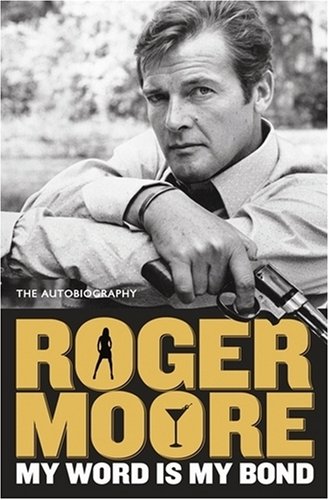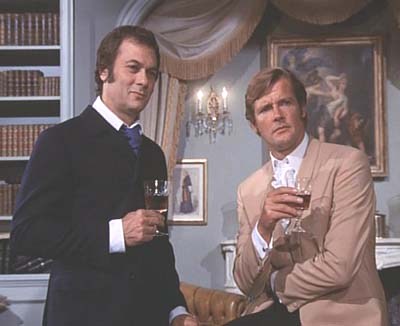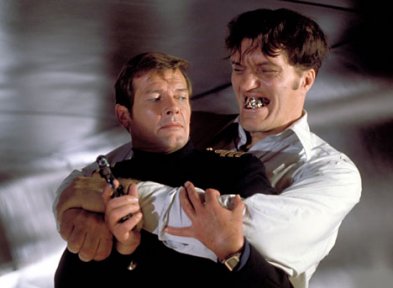|
My Word Is My Bond

My Word Is My Bond is the autobiography of Sir Roger Moore and was
published in 2008. As someone who is partial to an episode of The Saint
now and again and who still loves his super suave Bond saving the world
from Carl Stromberg and Hugo Drax in a blue blazer, I have no problem
in declaring that I am a Roger Moore fan. In fact, there wouldn't be a
Bond series today for Barbara Broccoli to ruin if Moore hadn't got it
through the seventies. My Word Is My Bond is a fairly undemanding but
pleasant read that - much like its author - is self-deprecating,
modest, slightly bawdy, conversational, nostalgic and generally
pleasant. Moore doesn't take himself too seriously and trawls through
his long life (he was 80 when this came out) and career with many
anecdotes, numerous famous faces (everyone from Elizabeth Taylor to
Tony Curtis to Noël Coward to David Niven), details and memories
from the many films he's made and, as you'd expect, sections on his
long service as a UNICEF Goodwill Ambassador.
Despite his urbane image as the archetypal English gentleman, Moore
came from a fairly humble background and was a policeman's son from
South London. His early memories are always warm and quite amusing
although you do start to wish he would move onto the film career after
a while. He recalls the Blitz, the family adopting a monkey (!) and
then trying to become an animator. He eventually went to Rada where he
met Lois Maxwell, who was of course later to play Miss Moneypenny in
the Connery and Moore Bond films. This era is brought back to life in
vivid fashion at times as he remembers provincial theatres and boarding
houses. I found Moore's recollections of his brief stint in Hollywood
as a young actor to be very interesting. He was married to the singer
Dorothy Squires (who was rather eccentric it seems) for a time and
under contract to MGM. Neither the marriage or the contract lasted but
Moore did get to act alongside a young Elizabeth Taylor in The Last
Time I Saw Paris. Moore seems to have fond memories of her, er, chest,
which he describes as 'hills of ripe young motherhood.'

It's fun when the book moves onto his television days, especially The
Saint, in which he played the debonair troubleshooter Simon Templar and
often directed the episodes too. Moore had been constantly linked to
James Bond since the inception of the series (Ian Fleming actually had
him in mind before Dr No) and it was The Saint that probably convinced
the Bond producers that Moore could be a solid 'holding' Bond for them
in the seventies after the Lazenby affair and Connery refusing to come
back. Moore recalls cold winter days in Elstree shooting The Saint and
always having to pretend on minimal budgets that Templar was in some
exotic land far away. This famous era of British fantasy television is
fascinating to hear about at first hand. Before he landed James Bond in
1972 Moore managed to do another television series, the somewhat kitsch
The Persuaders! with Tony Curtis. His memories of this show are fun too
- especially the incident where Curtis calls outraged guest star Joan
Collins a certain four letter word!
'When I have nothing nice to say about a person,' writes Moore. 'I'd
rather not say anything at all.' It explains the absence of dirt
dishing with few people seeming to irritate him in the book. One who
did though was Grace Jones, his co-star on A View To A Kill, which
seems to have been a difficult experience for Sir Rog at times. 'I'm
afraid my diplomatic charm was stretched to the limit. Every day in her
dressing room - which was adjacent to mine - she played very loud
music. I was not a fan of heavy metal. One day I snapped. I marched
into her room, pulled the plug and then went back to my room, picked up
a chair and flung it at the wall.' Moore has warm memories of the
legendary James Bond producer Cubby Broccoli although he does take
issue here with Broccoli's assertion that he gave Roger the heave-ho
after A View To A Kill for being too old (he was 57 at the time). Moore
maintains he had in fact retired himself from the series and no one
asked him to leave.

Moore has nothing earth shattering to say about his time playing James
Bond (seven films between 1973 and 1985) and regards it to be a happy
experience in the book with a friendly atmosphere on a set comprised of
many regulars who worked together on numerous Bonds like a family of
sorts. Moore recalls his various injuries and ailments making the films
and shares many anecdotes about everything from draughty love scenes at
a chilly Pinewood Studios to Christopher Lee singing Italian opera in
bed while on location in the Far East shooting The Man With The Golden
Gun. Some of Moore's passages about his work as a UNICEF Goodwill
Ambassador are quite touching at times towards the end. He explains
that Audrey Hepburn had persuaded him to become involved in 1991 and
when she died in 1993 he felt he had to continue her work.
Some readers might be a little disappointed that Moore doesn't reveal
an awful lot in the book. He doesn't indulge in tittle-tattle or
gossip, slag people off or drop any personal bombshells. It's not
really that type of book although there are occasional moments of
sadness. My Word Is My Bond is Moore chatting amiably about his life
and career and sharing anecdotes. What I quite liked about the book too
is that he manages to mention more or less everything he's been in,
even films that people might not be aware of like The Naked Face or Bed
and Breakfast. This is not the most demanding or weighty (just over 200
pages) memoir to ever hit the bookshelves but My Word Is My Bond is a
fun read for anyone interested in Roger and some of the more famous
roles he's taken on in his long and entertaining career.
- Jake
c
2010
Alternative 007
|

|


